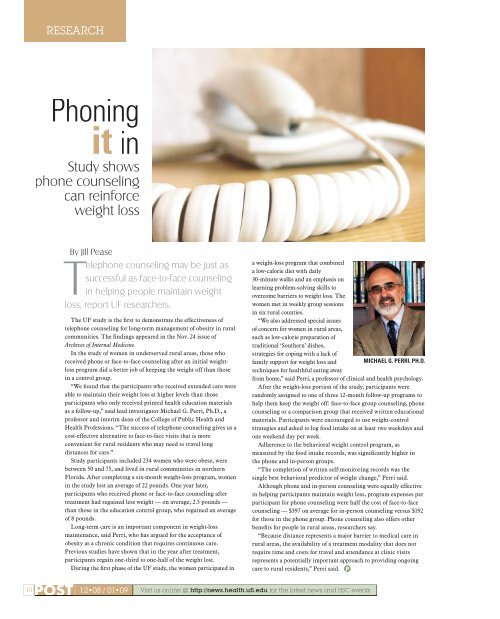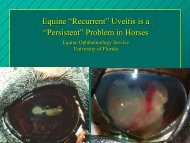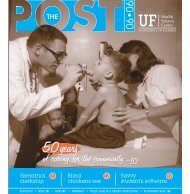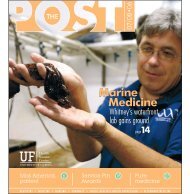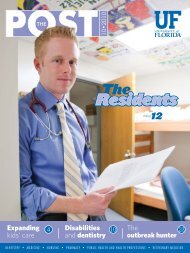RESEARCHPhoningit inStudy showsphone counselingcan reinforceweight lossBy Jill PeaseTelephone counseling may be just assuccessful as face-to-face counselingin helping people maintain weightloss, report <strong>UF</strong> researchers.The <strong>UF</strong> study is the first to demonstrate the effectiveness oftelephone counseling for long-term management of obesity in ruralcommunities. The findings appeared in the Nov. 24 issue ofArchives of Internal Medicine.In the study of women in underserved rural areas, those whoreceived phone or face-to-face counseling after an initial weightlossprogram did a better job of keeping the weight off than thosein a control group.“We found that the participants who received extended care wereable to maintain their weight loss at higher levels than thoseparticipants who only received printed health education materialsas a follow-up,” said lead investigator Michael G. Perri, Ph.D., aprofessor and interim dean of the College of Public <strong>Health</strong> and<strong>Health</strong> Professions. “The success of telephone counseling gives us acost-effective alternative to face-to-face visits that is moreconvenient for rural residents who may need to travel longdistances for care.”Study participants included 234 women who were obese, werebetween 50 and 75, and lived in rural communities in northernFlorida. After completing a six-month weight-loss program, womenin the study lost an average of 22 pounds. One year later,participants who received phone or face-to-face counseling aftertreatment had regained less weight — on average, 2.5 pounds —than those in the education control group, who regained an averageof 8 pounds.Long-term care is an important component in weight-lossmaintenance, said Perri, who has argued for the acceptance ofobesity as a chronic condition that requires continuous care.Previous studies have shown that in the year after treatment,participants regain one-third to one-half of the weight lost.During the first phase of the <strong>UF</strong> study, the women participated ina weight-loss program that combineda low-calorie diet with daily30-minute walks and an emphasis onlearning problem-solving skills toovercome barriers to weight loss. Thewomen met in weekly group sessionsin six rural counties.“We also addressed special issuesof concern for women in rural areas,such as low-calorie preparation oftraditional ‘Southern’ dishes,strategies for coping with a lack offamily support for weight loss andMICHAEL G. PERRI, PH.D.techniques for healthful eating awayfrom home,” said Perri, a professor of clinical and health psychology.After the weight-loss portion of the study, participants wererandomly assigned to one of three 12-month follow-up programs tohelp them keep the weight off: face-to-face group counseling, phonecounseling or a comparison group that received written educationalmaterials. Participants were encouraged to use weight-controlstrategies and asked to log food intake on at least two weekdays andone weekend day per week.Adherence to the behavioral weight control program, asmeasured by the food intake records, was significantly higher inthe phone and in-person groups.“The completion of written self-monitoring records was thesingle best behavioral predictor of weight change,” Perri said.Although phone and in-person counseling were equally effectivein helping participants maintain weight loss, program expenses perparticipant for phone counseling were half the cost of face-to-facecounseling — $397 on average for in-person counseling versus $192for those in the phone group. Phone counseling also offers otherbenefits for people in rural areas, researchers say.“Because distance represents a major barrier to medical care inrural areas, the availability of a treatment modality that does notrequire time and costs for travel and attendance at clinic visitsrepresents a potentially important approach to providing ongoingcare to rural residents,” Perri said. PPOST12•08 / 01•0910 POSTVisit us online @ http://news.health.ufl.edu for the latest news and HSC events.
FIVE QUESTIONSUnderstandingutismautismmJENNIFER ANNHARRISON ELDER,PH.D., R.N.What is autism?Autism occurs on a spectrum and to date has no clearly defi ned cause or cure.Individuals who have this disorder appear to not process the world in the same wayas non-affected individuals. To be diagnosed with autism, the individual must presentfeatures related to three areas: delayed speech and language, defi cits in socialrelatedness, and unusual repetitive behaviors and/or restricted interests. The severityof autism varies greatly, from individuals with little speech and poor daily living skills toothers who function well in most settings.When and how is autism diagnosed?Currently, autism is diffi cult to conclusively diagnose before 18 months of age.<strong>Health</strong>-care providers may detect symptoms during infancy, although a formaldiagnosis is generally not made until the child fails to develop functional language byage 2. There are several standard testing instruments that are available to diagnosechildren by age 3. Language delay or lack of appropriate social development may causeparents or teachers to seek an evaluation. Some children may have a period of normaldevelopment before the onset of symptoms and may even lose some earlier acquiredskills, such as early words or social smiling. Currently, there is no blood test or othermedical test available to diagnose autism. Correct diagnosis depends on extensiveand accurate developmental history, as well as observations of the child’s social,communicative and play behaviors.What are the causes of autism?PHOTO BY SARAH KIEWELBy Tracy Brown WrightAbout one in 150 children are diagnosed with autismeach year, according to the Centers for Disease Controland Prevention. This staggering number leaves manyparents wondering and worrying about this mysteriousdisorder and the effect it could have on their child.Jennifer Ann Harrison Elder, Ph.D., R.N., a professor andchair in the <strong>UF</strong> College of Nursing department of healthcare environments and systems, has studied autism andrelated child neuropsychiatric disorders for the past 27years. Much of her work examines methods of educatingfamilies, enhancing family cohesion and reducingcaregiver stress. She also evaluated the effects of agluten-free, casein-free diet on children with autism, oneof the first double-blind clinical trials of this diet. Needlessto say, she’s an expert. In this month’s POST, Elder answersour questions about autism.Genetic factors are considered to be some of the most recognized causes of autism. There arealso theories pointing to possible environmental triggers that may include diet, allergic reaction,virus or high fever. Many parents do believe there is a link between vaccinations and autismalthough, to date, no scientific study has borne this out. The Centers for Disease Control andPrevention currently states there is no clear link between the measles/mumps/rubella vaccine(widely reported by parents to be a cause) and multiple forms of autism.What would be your recommendationto parents who do not wish to vaccinatetheir children for fear of autism?I recommend that parents vaccinate their children. The risk and effects of illnesses that maystrike a child not protected against them far outweigh any other consideration. However, Ibelieve parents should discuss their concerns with their health-care provider and discuss avaccination schedule that is right for them. There are delayed vaccination schedules that stillprotect children against harmful diseases while allowing for more time between vaccinations andthe ability to split certain combined vaccinations.What are the treatments for autism?There are a variety of treatments available to autistic children. In our research, we havefocused on parent-training intervention because we believe well-informed parents can be the besttherapists, and the children are more likely to respond to their parents when they incorporatetraining strategies into their daily lives. Our research has shown that early intervention withautistic children can have a major influence on how the child develops and functions later in life.There are many other types of treatments available, including the wheat-free, dairy-free diet inwhich many parents have taken interest. We conducted the first published double-blind clinicaltrial of this diet in autism. We could find no significant differences in symptoms between thechildren receiving the diet and those not receiving the diet. However, anecdotally, parents ofseven children reported improvements in language and decreased hyperactivity and tantrums.We plan to conduct a future study examining the effects of the diet over longer periods of timewith more subjects. PVisit us online @ http://news.health.ufl.edu for the latest news and HSC events. 12•08 / 01•09POST11


